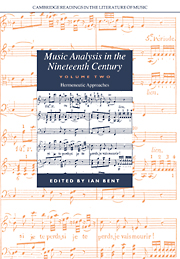Book contents
- Front matter
- Contents
- Preface to volumes I and II
- List of abbreviations
- General introduction
- Part I: Elucidatory analysis
- Part II: Objective–subjective analysis: the hermeneutic circle
- Introduction
- Analysis 8 Jérôme-Joseph de Momigny (1762–1842)
- Analysis 9 Ernst Theodor Amadeus Hoffmann (1776–1822)
- Analysis 10 Robert Schumann (1810–1856)
- Analysis 11 Abramo Basevi (1818–1885)
- Analysis 12 Adolf Bernhard Marx (1795?–1866)
- Analysis 13 Theodor Helm (1843–1920)
- Afterword to volumes I and II
- Bibliographical essay
- Index to Volumes I and II
Introduction
Published online by Cambridge University Press: 10 December 2009
- Front matter
- Contents
- Preface to volumes I and II
- List of abbreviations
- General introduction
- Part I: Elucidatory analysis
- Part II: Objective–subjective analysis: the hermeneutic circle
- Introduction
- Analysis 8 Jérôme-Joseph de Momigny (1762–1842)
- Analysis 9 Ernst Theodor Amadeus Hoffmann (1776–1822)
- Analysis 10 Robert Schumann (1810–1856)
- Analysis 11 Abramo Basevi (1818–1885)
- Analysis 12 Adolf Bernhard Marx (1795?–1866)
- Analysis 13 Theodor Helm (1843–1920)
- Afterword to volumes I and II
- Bibliographical essay
- Index to Volumes I and II
Summary
In Part II of volume I, we saw in the work of Johann Christian Lobe an innovative approach to the teaching of composition – an approach based on the alternation of analysis and synthesis, the discourse conducted wholly at the materialistic level using technical language and adducing rules and maxims for the student's guidance. The extract (Analysis 12), dating from 1850, dealt with first-movement form in the string quartet. For seventy-five pages, Lobe discussed formal plan, melodic construction, the invention of musical ideas, and the scoring and final polishing of a movement – a purely technical treatment of form based on what little was known in that pre-Nottebohm era of Beethoven's sketching habits.
This particular extract, however, continues for a further fifteen pages with a chapter entitled ‘Spiritual Content in Pieces of Music’. It is not sufficient, this chapter tells us, for a piece to sound well and exhibit order and symmetry (its ‘external manifestations’): it must also have effective content and perceptible expression (its ‘internal manifestations’). Accordingly, Lobe now instructs the student in the communication of feeling through instrumental music, using analysis. He takes instances first of fear (in The Magic Flute), then of grief (the third movement of Beethoven's String Quartet Op. 59 no. 1), of conflicting emotions (there and in Weber's Der Freischütz), then of cheerfulness (quoting a celebrated analysis by Gerber of the main theme from the first movement of Haydn's Symphony No. 104), and finally fateful questioning (Beethoven's String Quartet Op. 135).
- Type
- Chapter
- Information
- Music Analysis in the Nineteenth Century , pp. 121 - 126Publisher: Cambridge University PressPrint publication year: 1994

